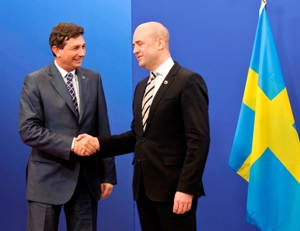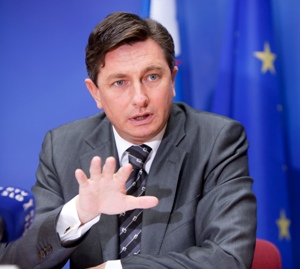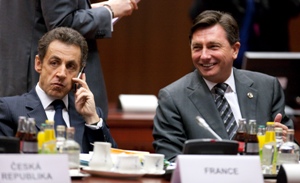NEWS
Prime Minister Pahor: Slovenia's climate aid worth EUR 8 million
The Prime Minister of the Republic of Slovenia, Borut Pahor, announced at the European Council today in Brussels that Slovenia will over the next three years (2010–2012) provide EUR 8 million to help developing countries deal with the effects of climate change. At the close of its two-day meeting, the European Council agreed that the EU, as a whole, would over this three-year period contribute EUR 2.433 billion for fast-start funding related to climate change. This is one of the steps by which the EU wishes to initiate and secure an ambitious global deal at the Copenhagen negotiations on climate.
(Foto: Wiktor Dabkowski)
"Slovenia neither wants nor can afford itself to be among the countries not making a commitment for fast-start financing. We were among those countries that relatively rapidly and positively responded to the informal appeal of the Swedish EU Presidency in this connection," said Prime Minister Pahor.
Over the next three years, fast-start funding to cope with climate change is expected to require between EUR five and seven billion, and the EU has lent its supports to the higher figure. In its efforts to reach an ambitious global agreement in Copenhagen, the European Council also announced that the EU had reaffirmed its offer to increase to 30% the amount by which it is prepared to reduce its greenhouse gas emissions by 2020 if other developed countries make comparable offers. At the Copenhagen talks, which end on 18 December, only ambitious commitments can lead to the achievement of the goal of restricting the increase in global temperature to below 2 degrees Celsius.
(Foto: Thierry Monasse/STA)
The issue of climate change was not the only item on the agenda of the December European Council meeting. The EU leaders again discussed the economic and financial crisis and exit strategies. The council was unanimous that under the Stability and Growth Pact, fiscal consolidation should start in 2011 at the latest by reducing the deficits of Member States well beyond 0.5% of GDP per year. Slovenia supports these goals and the group of ministers entrusted with the preparation of the exit strategy will duly consider them. In addition, the Slovenian exit strategy will also include aspects of green policy, said Mr Pahor. The European Council also launched a debate on the strategy for development over the next ten years (2020 Strategy) and indicated several key areas of focus for the EU. Building on the work already carried out, EU leaders will continue to discuss this topic at the 2010 Spring meeting.
(Foto: Thierry Monasse/STA)
The European Council also adopted a new multi-year programme in the area of justice and home affairs (the Stockholm Programme). This is a balanced programme in terms of the relation between respecting fundamental rights and freedoms and the right to free movement, while at the same time guaranteeing security for EU citizens. An important element of the programme is the upgrading of measures to protect the external EU border, which, in view of the length of the Schengen border, is very important for Slovenia. During the negotiations, Slovenia specifically emphasised the importance of co-operation with the Western Balkan region with the aim of ensuring that this region ranks high on the EU agenda in the area of justice and home affairs.






